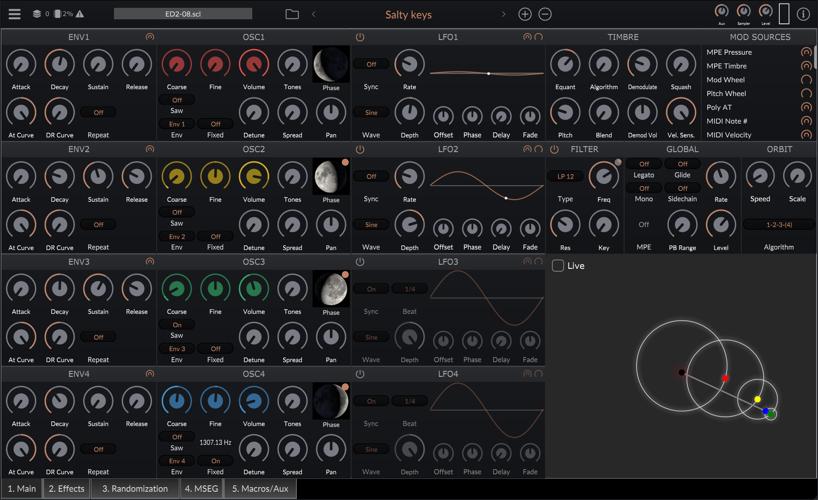Audible Planets Win Mac Linux
Free | Win Mac Linux | 40 MB
An expressive, quasi-Ptolemaic semi-modular synthesizer.
Features
“Orbital Modulation” (OM) synthesis
Randomizable modulation matrix
Built-in effects chains
Overview
Four bodies revolve with uniform circular motion, each around one of the others or, in the case of the first body, a fixed central point. Each body around which no other body revolves serves as an oscillator, producing sound. The interpretation of these terminal bodies as oscillators depends on their positions as viewed from a point that is either at the fixed center of revolution or nearby, at a point called the “equant,” more in honor of Ptolemy than in strict adherence to his system (hence “quasi-Ptolemaic”). In the engine’s fully modulated state (i.e., with the “Demodulate” knob turned all the way down), only the angle formed by a reference line and the line connecting the equant to the terminal body matters to the sound, just as, in Ptolemy’s system, the distances of the heavenly bodies are unknown. This system of sound generation closely resembles frequency modulation (FM) synthesis. The relative speeds of revolution of the various bodies have their analogues in the frequencies of so-called “carrier” and “modulator” (or “operator”) waves in traditional FM synthesis. Accordingly, the interface allows both (“coarse”) whole-number and (“fine”) fractional variation of these relative frequencies, producing a wide array of timbres, from the pure and simple to the densely inharmonic. Many mutually modulatable parameters are configurable by the user, and a robust system of randomization facilitates sonic exploration and discovery.
Gratitude
I’ll speak later about some of the sources of inspiration for this project, but don’t want to go any further without acknowledging that none of this would have been possible for someone like me—a humanist with an idea, not a software engineer—without the wealth of open-source tools, instruction, and advice provided freely by the community of professionals and enthusiasts. I’m especially grateful for the existence of the JUCE framework and for the many helpful extensions to it provided by Gin (which did a LOT of heavy lifting) and the visualization tools in Melatonin Blur. Early prototypes were built in VCV RACK, which was a relatively easy way to get started with audio programming and boasts a vibrant community. As a novice who needs a lot spelled out, I got quite a lot out of Will Pirkle’s teacherly books. Finally, mostly by lurking and poring over old posts, but sometimes by posing ill-formed questions and follow-ups of my own, I learned a lot on the Discord server for The Audio Programmer, mostly that other people who do this kind of thing regularly know a lot more than I am ever likely to.
![]()
![]()
![]()
![]()
![]()
![]()
Audible_Planets1.0.8 ( 40 MB )

